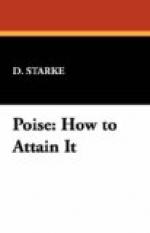COMPOSURE
One of the essential conditions of acquiring poise is to familiarize oneself with the habit of composure.
Timid people know nothing of its advantages. They are always ill at ease, fearful, devoured by dread of other people’s censures, and completely upset by the idea of the least initiative.
Their mania leads them to exaggerate the smallest incident. A trifle puts them in a panic, and at the mere notion that strangers have perceived this they become quite out of countenance and are possest by but one idea, to avoid by flight the repetition of such unpleasant emotions.
A quite useless attempt, for in whatever retirement people who lack poise may live, they will find themselves certainly the victims of the small embarrassments of every-day life, which, in their eyes, will soon take on the guise of disasters.
Composure should, then, be the first achievement in the way of self-conquest to be aimed at by the man who is desirous of attaining poise.
But, it will be objected, composure is a condition that is not familiar to everybody. It is a question of temperament and of disposition. Every one who wishes for it can not attain to it.
This is an error. In order to possess composure, that is to say the first step in the mastery of self which enables one to judge of the proportions of things, it must be achieved, or developed, if we happen to be naturally inclined thereto.
To accomplish this, deep-breathing exercises are often recommended by the philosophers of the new school.
They advise those who are desirous of cultivating it to make no resolution, to commit themselves to no impulsive action, without first withdrawing into themselves and taking five or six deep breaths in the manner we have described in the preceding chapter.
This has the physical effect of reducing the speed with which the heart beats and, as a result, of relaxing the mind and quieting one’s nerves.
During the two or three minutes thus employed one’s enthusiasm wanes and one’s ideas take on a less confused form. In a word, unreasoning impulses no longer fill the brain to the extent of inhibiting the entrance of sober second thought.
But this is only an adventitious means of prevention. We will now speak of those which should become a matter of daily practise and whose frequent repetition will lead to the poise we seek.
Every one whose profession makes it necessary to cultivate his memory recognizes the importance of studying at night. Phrases learned just before going to sleep fix themselves more readily in the mind. They remain latent in the brain and spring up anew in the morning without calling for much trouble to revive them.
For this reason it is well to retire to rest in a mental attitude of deliberate calm, repressing every sort of jerky movement and constraining oneself to lie perfectly quiet.




